Eddie Jones: Meet England's new coach for Six Nations 2016
- Published
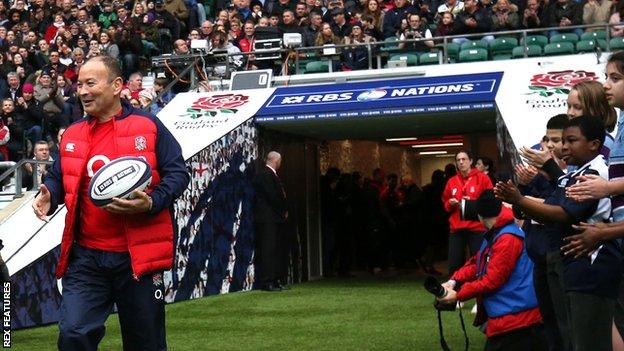
Jones held a public training session at Twickenham last Friday
RBS Six Nations |
|---|
Dates: Saturday, 6 February - Saturday, 19 March |
Coverage: Live coverage of eight games on BBC One and BBC One HD. All of Scotland's matches live on BBC Radio Scotland. Live text commentary on the BBC Sport website. |
England's new head coach Eddie Jones, like his predecessor Stuart Lancaster, was once a teacher.
But when they left the classroom behind, the similarities ended.
Lancaster was a Rugby Football Union company man. The Cumbrian was promoted into one of the most coveted jobs in world rugby with an abundance of good intentions, but a glaring lack of club - never mind international - coaching experience.
Jones has taken a route never travelled. From the wrong side of the Sydney tracks, to national hero in Japan and now England's first foreign head coach, via two World Cup finals and club rugby on three continents.
As the 56-year-old Australian prepares to begin a new era with the oldest international fixture - a meeting with Scotland in Edinburgh on Saturday - we trace the experiences that formed him and will form England.
Date (kick-off time GMT) | Fixture | TV coverage |
|---|---|---|
Sat, 6 Feb (14:25) | France v Italy | BBC One |
Sat, 6 Feb (16:50) | Scotland v England | BBC One |
Sun, 7 Feb (15:00) | Ireland v Wales | ITV |
'We turned up just in our rugby shirts'
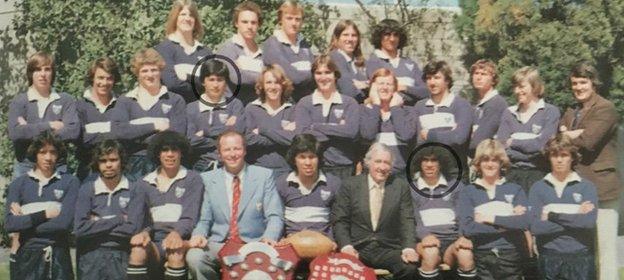
Matraville's 1977 first XV with Eddie Jones (circled in the second row), Glen Ella (circled in front row) and captain Lloyd Walker
Glen Ella first met Jones at La Perouse primary school when they were five years old. They have been friends, team-mates and coaching colleagues for 50 years.
Their secondary school was Matraville High in an eastern suburb of Sydney known chiefly for the airport, the notorious Long Bay jail and swaths of social housing.
Matraville did not have rugby union team when Ella and Jones first arrived. By the time they left it had nurtured half a future Wallabies backline.
"We were all rugby league players at first, coming from a strong league part of Sydney. Then the coach changed Matraville to a union school just as we were turning 13," Ella explains.
"We had a very mobile pack - Eddie was part of that as hooker - and we had some pretty good backs.
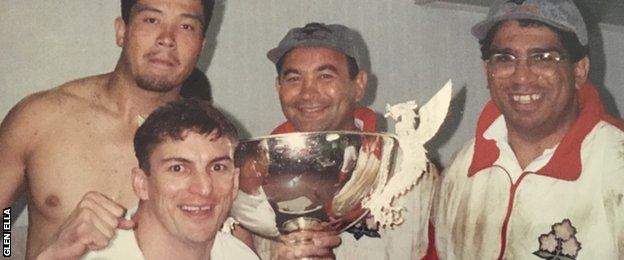
Glen Ella (far right) recommended Jones for the job as Japan forwards coach, which he filled between 1996 and 1997.
"Me, my other two brothers Gary and Mark, and Lloyd Walker all represented Australia - four Wallabies to come out of that school backline. We could run riot a little bit."
Former Australia, Leicester and Randwick coach Bob Dwyer was moved to call the Matraville class of 1977 "the most freakish group of kids ever to come together"., external Their clashes were cultural as well as physical.
"We won three out four state competitions. One time we played St Josephs College, a big private school and probably the biggest rugby school in Australia," adds Ella.
"We turned up just in our rugby shirts. That was all we had. We were all wearing board shorts and different coloured socks.
"They turned up with four buses, did this big run-through and war chant and we thought 'what the hell is going on here?'.
"It was kind of a scary moment - but we smacked their asses anyway."
Jones, whose Australian soldier father met his Japanese mother while Allied Forces occupied Tokyo at the end of the Second World War, excelled in the classroom as well as on the pitch.
"Eddie was probably the most academic of all the mates he played rugby with," adds Ella.
"He was very, very bright. He was still part of the boys, he just applied himself better than the rest of us.
Eddie Jones coaching career | |
|---|---|
1994 | Randwick reserve team |
1995 | Tokai University |
1996 | Suntory Sungoliath |
1996-97 | Japan national team (forwards coach) |
1998-2001 | Brumbies |
2001-2005 | Australia |
2006 | Saracens (consultant) |
2007 | Queensland Reds |
2007 | South Africa (technical advisor for World Cup) |
2007-09 | Saracens |
2009-2012 | Suntory Sungoliath |
2012-2015 | Japan |
2015 | Stormers |
2015-present | England |
'Not the biggest guy that God put breath into'
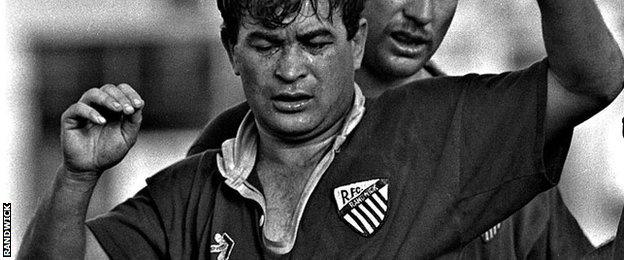
Jones, failed to win an international cap, but faced off against All Black legend Sean Fitzpatrick when New Zealand played Randwick in 1988
If Jones' latest involvement with English rugby is a landmark, his first was a footnote.
Towards the end of a career in which he played more than 150 times for Australian club side Randwick and represented New South Wales, Jones briefly turned out for Leicester.
Welford Road in the early 1990s, where big beasts such as Dean Richards, Graham Rowntree and John Wells roamed, had a culture of hard men, hard training and hard yards.
Jones, who weighed less than 12 stone 8 pounds (80kg), remembers trying a quick line-out and being informed by a prop "we don't do that here"., external
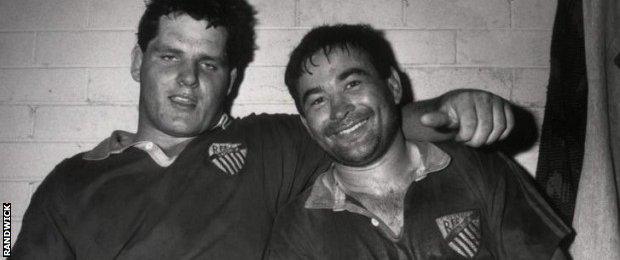
Jones (right) played alongside another future Wallabies coach, Ewen McKenzie, during his time at Randwick
He made three first-team appearances during the 1991-92 season, featuring in victories over Bedford, Oxford University and Nuneaton, before returning to Australia to work as a teacher and coach at Randwick.
"He was not your typical rough-and-tumble type of hooker. He played almost more as a back row," said Wayne Richardson, who played prop alongside Jones during his short time at Tigers.
"He was an excellent tackler - he had to be at his size, he was not the biggest guy that God put breath into.
"He enjoyed a beer - he would always stick about in the clubhouse and mix well with the lads. He was a nice bloke, quiet, unassuming, but gave the impression that he knew what he wanted from life. I guess that has been borne out by where he is now."
'If need be, he'll cut them to shreds'
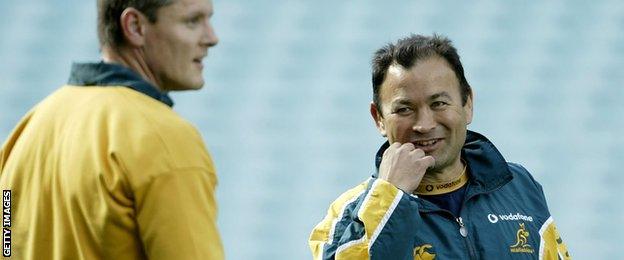
Burke (left) made 81 appearances for the Wallabies before spending four years playing for Newcastle from 2004
As Sir Clive Woodward's opposite number in the 2003 World Cup final,, external Jones already had an unwanted role in English rugby's finest hour.
However, Australia's mere presence in the match was testament to his abilities.
Beaten 50-21 by New Zealand less than four months before, Jones turned the tables to shock the All Blacks in the semi-finals, external and give the Wallabies a shot of retaining their title on home soil.
"We weren't the best team in the tournament, but we almost stole it," recalls full-back Matt Burke.
"It was a real opportunity, there were just three points in it after 100 minutes of rugby in the final."
It was a game that Burke watched from the stands in his suit. He had played in all four of the Wallabies' group games, but was dropped for the quarter-final, the last-four tie and the final.
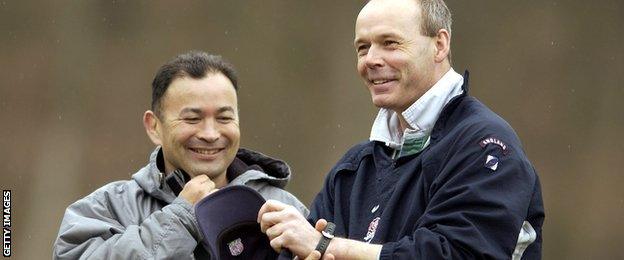
Jones and Woodward (left) exchanged barbs in the media before the 2003 final with Jones asking one journalist if his England counterpart had got him to ask a particular question
"That 2003 team was a really tight group. Eddie managed those players who were out of the squad, keeping them motivated and preventing the whole thing from fracturing," he reflects.
"He quickly worked out each player - which to mollycoddle and which to yell at.
"Whether he is talking to a 6ft 8in lock or a slight fly-half, he has the same intensity and authority and, if need be, he can cut them to shreds. His tongue is very sharp.
"I was 30 back in 2003 and we had some frank conversations about what I could do better to extend my career, but I enjoyed my time working with Eddie."
And for Jones, all time is work time.
"The assistant coaches were getting emails at two in the morning telling them what could be done," remembers Burke.
Ella, part of that backroom team, remembers Jones also shoving hard copies of his tactical thoughts under his hotel room door in the small hours. He adds that - certainly before suffering a stroke in October 2013 - Jones routinely got only five hours sleep a night..
"He certainly gets his pound of flesh from his players and I think they respond to that pressure," adds Burke
"Eddie likes information to come from the players but, at the end of the day, he is the coach and tells you what to do. I like that in him and, looking from afar, maybe there were a few too many chiefs in that England team at the recent World Cup."
Jones' record in charge of Australia | |||
|---|---|---|---|
Played | Won | Drawn | Lost |
57 | 33 | 1 | 23 |
'Blazering' a trail
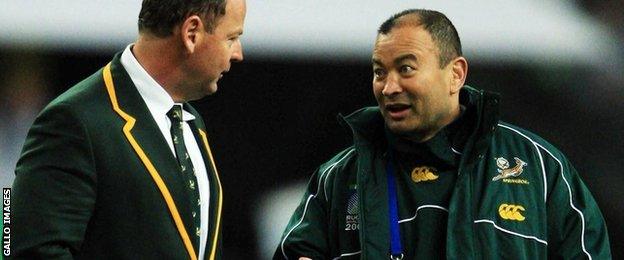
Jones (right) wears a team coat, while Jake White sports the Springbok blazer denied his colleague
Four years later, same stage, same opposition, but a different employer and a different outcome.
Hired by head coach Jake White as a technical adviser just before the 2007 World Cup in France, Jones helped the Springboks to their first title on foreign soil with a narrow victory over England in the final., external
But it was at the post-match meal that Jones' influence on South Africa was most obvious.
Despite protests from the squad and coaches, the South African Rugby Union had ruled that Jones - as a foreigner - would not be permitted to wear the Springboks' green-and-yellow team blazer.
After their victory, wing Bryan Habana duly gave his to Jones as a thank you and he, the rest of the team and Jones wore matching suits instead to the celebrations.
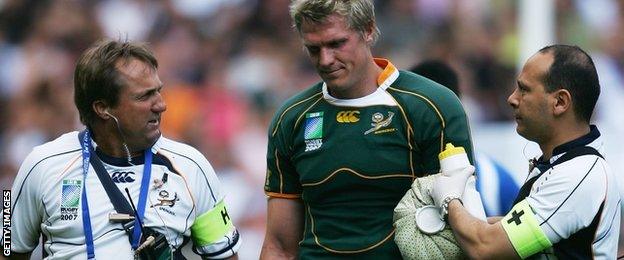
Jean de Villiers played only a small part in South Africa's triumph. He suffered a torn bicep in the Springboks opening game against Samoa
"Eddie only joined up with us a couple of weeks before we went to France, but his impact was immediate," explains centre Jean de Villiers, who was part of the squad.
"He helped with the backline's creativity by fixing running lines and minor details that you sometimes miss which can make a big difference.
"In the end stages of the competition he also helped to settle the nerves of our coaching staff as they came under pressure. His experience of 2003 really helped."
De Villiers has more recently been on the other end of Jones' wisdom, issuing an excruciating apology to the South African nation after a shock defeat to Japan at the 2015 World Cup.
"Everything that they did that day was cohesive and the team effort was just great - you could see Eddie's hand in that," he added.
"Everyone was talking about the scrum as an opportunity for us and Eddie's analysis took it out as a contest.
"The hooker was hooking the ball back very fast. It was the first time I have played in a defence where you see the ball go into the scrum and not even two seconds later the ball is out and in the inside centre's hands."
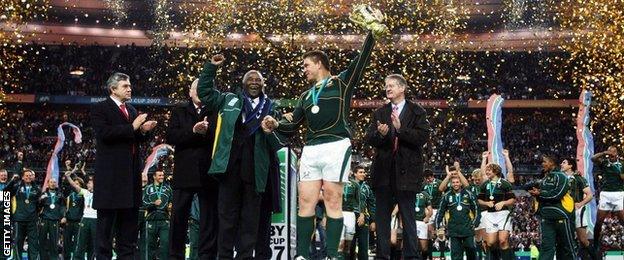
South Africa president Thabo Mbeki joined captain John Smit to collect the trophy
'A bit of the Aussie larrikin'
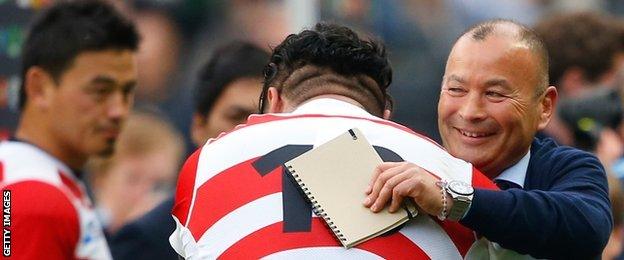
Jones' leadership is so valued in Japan that he has been appointed to the board that advises Goldman Sachs bank in the country
The Brave Blossoms' spectacular heist against the Springboks made 'rugby' the third most commonly searched word in Japan., external
Neatly, it came about through Jones' own search for Japan's national character.
"Adapting his style for Japanese thinking and technique was something he thought long and hard about," explains Craig Wing, a former Australia rugby league international who was part of the Japan World Cup squad and first met Jones when he tried to persuade him to switch codes 15 years ago.
"He wanted to play a fast style of play that revolved around fitness, body height and mobility so that our perceived weight disadvantage was an advantage.
"In high school in Japan, they get taught to tackle, not just below the waist, but below the knees.
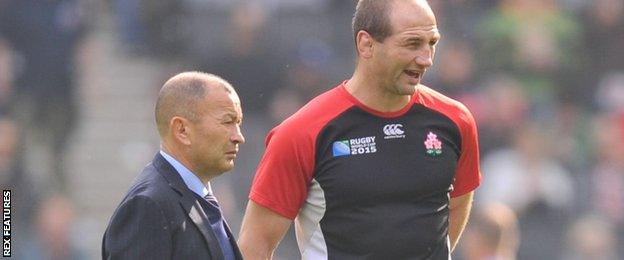
Former England captain Steve Borthwick was part of Jones' staff during his time with Japan and has been made forwards coach in the England set-up
"It was a big shock to me and when I first came to Japan. I thought it was quite stupid because you would see guys getting knocked out, but Eddie turned that into a strength as well.
"South Africa had big strong runners, who like contact, but they could not bump any of our guys off because they were so low."
Jones also tapped into the ferocious work ethic that sees the average Japanese office worker take only half of their 18 days of paid holiday, external for fear of disloyalty to their company and colleagues.
"The first World Cup training camp was in April 2015 and for five weeks we did not get a single day off - we did something like 105 sessions in that period," explains Wing.
"We would have 05:30 starts and some of the medical staff would not finish until 23:00 at night - but everything with Eddie had a purpose. I never felt that we were going through the motions and doing a drill to tick a box."
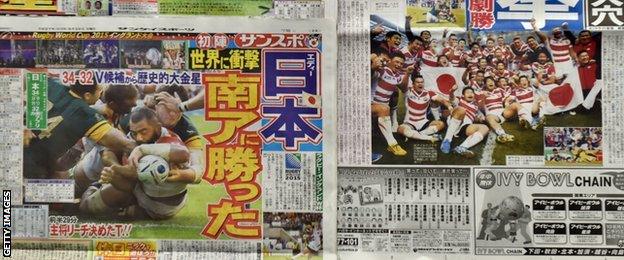
Jones' side put rugby on the front pages of Japanese newspapers with their win over South Africa
Jones has spoken about rediscovering England's traditional strengths of "a strong set-piece", a "strong defence" and, above all, a "bulldog spirit" to get their chariot back on the road, although he will have less access to his players than he did with Japan.
His appointment of Dylan Hartley as captain - complete with lengthy disciplinary rap sheet - suggests he will not be spending as much precious time preaching "culture", "values" and "ethics" as predecessor Stuart Lancaster did., external
"There is a bit of the Aussie larrikin in Eddie. He understands young guys will be young guys, they are going to do silly things, but if your performance is there what you do off the field is your responsibility," says Wing.
"He is not a babysitter and the team is not there to babysit you."
Jones certainly will not be content to sit back and supervise. For better or worse, England will learn lessons - and fast - from their first foreign coach.
Have you added the new Top Story alerts in the BBC Sport app? Simply head to the menu in the app - and don't forget you can also add score alerts for the Six Nations, your football team and more.
- Published4 February 2016
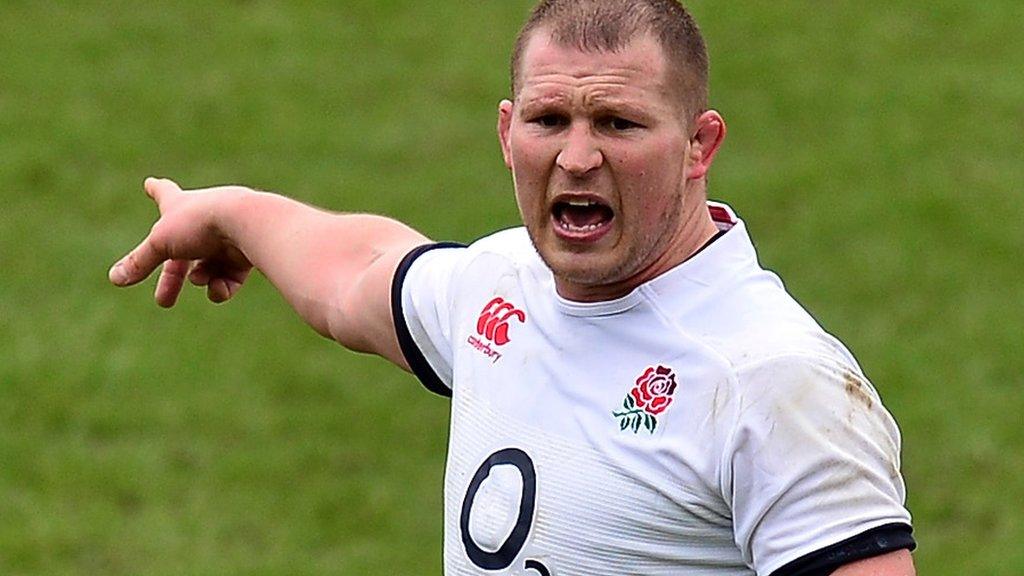
- Published4 February 2016
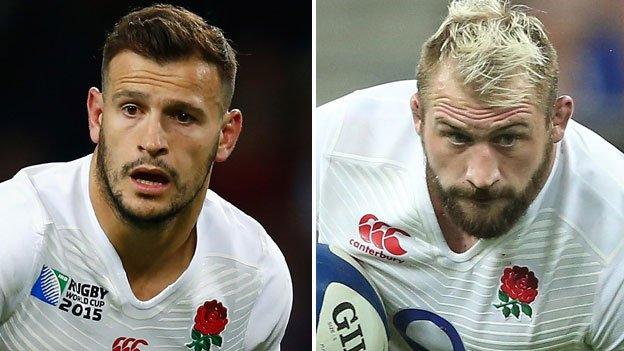
- Published26 January 2017
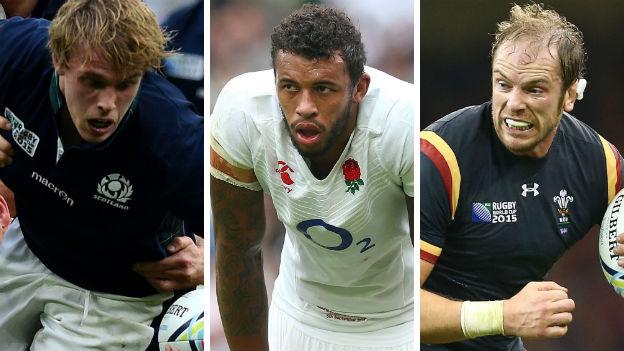
- Published23 March 2015
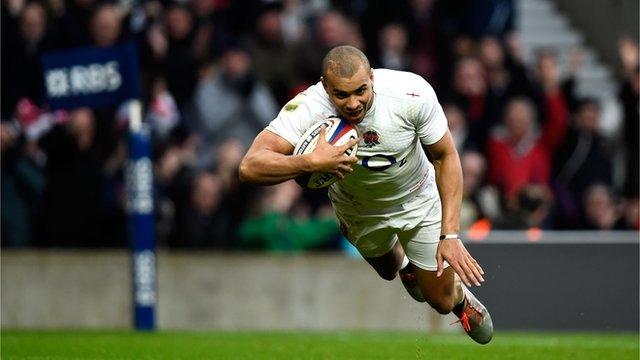
- Published10 February 2016
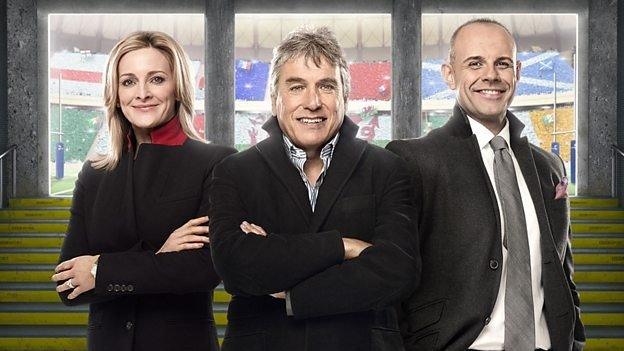
- Published3 February 2017

- Published15 February 2019
